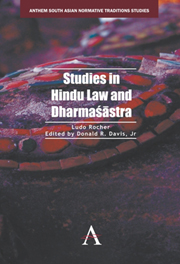Book contents
- Frontmatter
- Contents
- Foreword by Richard W. Lariviere
- Preface
- Abbreviations
- Note on the Edition
- Introduction
- PART ONE THE NATURE OF HINDU LAW
- PART TWO GENERAL TOPICS OF HINDU LAW
- Ancient Hindu Criminal Law
- Hindu Law of Succession: From the Śāstras to Modern Law
- Caste and Occupation in Classical India: The Normative Texts
- Megasthenes on Indian Lawbooks
- The “Ambassador” in Ancient India
- The Status of Minors according to Classical Hindu Law
- Quandoque bonus dormitat Jīmūtavūhanas?
- Notes on Mixed Castes in Classical India
- Inheritance and Srāddha: The Principle of “Spiritual Benefit”
- The Theory of Matrimonial Causes According to the Dharmaśāstra
- Jīmūtavūhana's Dāyabhāga and the Maxim Factum Valet
- The Divinity of Royal Power in Ancient India according to Dharmaśāstra
- A Few Considerations on Monocracy in Ancient India
- PART THREE HINDU LEGAL PROCEDURE
- PART FOUR TECHNICAL STUDIES OF HINDU LAW
- PART FIVE ANGLO-HINDU AND CUSTOMARY LAW
- Bibliography
- Index
Jīmūtavūhana's Dāyabhāga and the Maxim Factum Valet
from PART TWO - GENERAL TOPICS OF HINDU LAW
Published online by Cambridge University Press: 05 February 2013
- Frontmatter
- Contents
- Foreword by Richard W. Lariviere
- Preface
- Abbreviations
- Note on the Edition
- Introduction
- PART ONE THE NATURE OF HINDU LAW
- PART TWO GENERAL TOPICS OF HINDU LAW
- Ancient Hindu Criminal Law
- Hindu Law of Succession: From the Śāstras to Modern Law
- Caste and Occupation in Classical India: The Normative Texts
- Megasthenes on Indian Lawbooks
- The “Ambassador” in Ancient India
- The Status of Minors according to Classical Hindu Law
- Quandoque bonus dormitat Jīmūtavūhanas?
- Notes on Mixed Castes in Classical India
- Inheritance and Srāddha: The Principle of “Spiritual Benefit”
- The Theory of Matrimonial Causes According to the Dharmaśāstra
- Jīmūtavūhana's Dāyabhāga and the Maxim Factum Valet
- The Divinity of Royal Power in Ancient India according to Dharmaśāstra
- A Few Considerations on Monocracy in Ancient India
- PART THREE HINDU LEGAL PROCEDURE
- PART FOUR TECHNICAL STUDIES OF HINDU LAW
- PART FIVE ANGLO-HINDU AND CUSTOMARY LAW
- Bibliography
- Index
Summary
For a number of years I have been working on a new translation, to be followed by a first critical edition, of Jīmūtavāhana's Dāyabhāga, the twelfth-century nibandha which the British authorities in Calcutta heralded as the principal Sanskrit text on inheritance for the Bengal School of Hindu Law. The Dāyabhāga has been translated only once, in 1810 (together with the section on inheritance of Vijñāneśvara's commentary on the YDh, the Mitākṣarā), by Henry Thomas Colebrooke. Colebrooke's translation has been often reprinted but has never been replaced.
The new translation has been close to completion for some time, except, first, for a few specific and well circumscribed passages in which Jīmūtavāhana's reasoning is not yet sufficiently clear, and, second, on account of some general problems which make me wonder whether anyone so far has understood Jīmūtavāhana as he wished to be understood. It is one of these general problems which I want to address in the following pages.
One important way in which Jīmūtavāhana and, as a result, the Bengal School of Hindu law under British rule and in Independent India until 1956 differed from Hindu law elsewhere in India, was that, for the author of the Dāyabhāga, the head of the joint family has absolute power over joint family property. No one else, not even his sons, has any right of ownership as long as he is alive. They cannot sell it, gift it, or dispose of it in any form, without their father's permission.
- Type
- Chapter
- Information
- Studies in Hindu Law and Dharmasastra , pp. 305 - 314Publisher: Anthem PressPrint publication year: 2012

